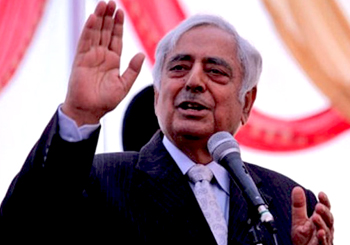Jammu, Feb 25: Peoples Democratic Party (PDP) patron Mufti Mohammad Sayeed, who is likely to be the next Chief Minister of Jammu and Kashmir, said differences with BJP over contentious issues like Article 370 and AFSPA have been ironed out in the Common Mininum Programme.

The 78-year-old former CM said it would be a historic opportunity for the PDP-BJP alliance to remove the decades of mistrust between the two regions of the state.
He also said that with the mandate BJP has at the Centre, the ruling coalition in the state would be able to achieve much more on both peace and development fronts.
“I see this (PDP-BJP coalition) as an historic opportunity to end the decades of mistrust between Kashmir and Jammu regions of the state, Sayeed told PTI here.
Sayeed, whose PDP is all set to form the government with BJP, said the mandate thrown up by the state assembly elections late last year had made it inevitable for the two parties to come together to deliver on peace and development agenda.
PDP won 28 seats and BJP 25 in the 87-member Assembly. Together, they are comfortably placed well above the majority figure of 44 to form the government.
“There is no other option (other than PDP and the BJP alliance). We had offers of support from the National Conference as well as the Congress for government formation but governance is not our only aim. We have to also deliver on the peace agenda,’ the former Chief Minister said.
“With the mandate BJP has at the Centre, we will be able to achieve much more on both peace and development fronts. Any other alternative may not be feasible at all for the state,” he said.
The veteran politician said the PDP-BJP alliance in the state would be a win-win situation for both the parties but more importantly it will be beneficial to the state.
Asked about sharp differences between the PDP and BJP over issues like Article 370 and AFSPA, Sayeed said all the issues have been addressed and shall be reflected in the Common Minimum Programme.
“Please wait for some more time. The differences have been ironed out and everything will be clear in the CMP,” the PDP patron said.
Sayeed is likely to meet Prime Minister Narendra Modi in Delhi tomorrow.While BJP has been advocating repealing Article 370 of the Constitution, the PDP has been a strong votary of strengthening the constitutional proviso that gives special status to Jammu and Kashmir within the Indian Union.
The two parties also had diametrically opposite stands on revocation of controversial Armed Forces Special Powers Act (AFSPA), which gives immunity from prosecution to the armed forces, from the state.
Sayeed said a PDP-BJP government can end the perceived regional discrimination in the state and instill a feeling of empowerment among all the people of the state.
“We will ensure that every region gets its due share in development as we managed to do in the short stint in the government from 2002 to 2005,” he said.
Sayeed praised the Prime Minister saying his actions in respect of certain incidents in Kashmir have evoked hope.
“I do not know the Prime Minister personally but the action in Chaterrgam firing incident (last year) and the action against army troops in Macchil fake encounter case indicate that he is serious about human rights issue,” he said.
Two boys were killed in army firing at Chattergam in Budgam district on November 3 last year. Army ordered an inquiry and indicted its troops.
The army court martial also found several army personnel guilty of staging a fake encounter in Macchil in April 2010, killing three innocent civilians for cash rewards and out of turn promotions.
Sayeed also had kind words for National Conference founder Sheikh Mohammad Abdullah saying he took some good steps for the welfare of the people of the state.
“Sheikh Sahib formed the institution of District Development Board. He would listen to the local MLA and issue on the spot instructions wherever needed,” Sayeed said.
The PDP patron played a key role in bringing down the Sheikh Abdullah-led government in 1977. The National Conference founder had been given the reigns of the state by then Prime Minister Indira Gandhi following the 1975 Delhi Accord.





Comments
Add new comment